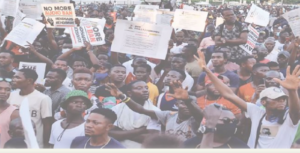FearlessInOctober: Nigeria’s Looming Protest and the Urgent Government Response Needed
FearlessInOctober: Nigeria’s Looming Protest and the Urgent Government Response Needed

Nigeria faces the potential for new unrest as another protest, dubbed #FearlessInOctober, is set to take place just weeks after the disruptive #EndBadGovernance demonstrations. The country is still reeling from the economic impacts of the previous protests, and a new wave of demonstrations could escalate tensions further.
According to Damilare Adenola, Director of Mobilisation for the Take It Back Movement, the upcoming protests will echo the demands of previous ones but will be adjusted to address worsening conditions in the country.
The protests held from August 1-10 aimed to highlight severe economic hardships. While initially supported by many Nigerians, the demonstrations soon escalated into violent clashes, looting, vandalism, and deadly encounters with security forces, resulting in over 30 deaths and more than 1,000 arrests.
Given the gravity of the situation, the protest organizers might consider pausing to allow the government time to respond before initiating further action.
The root causes of the unrest—severe hunger and economic difficulties—demand urgent government action. The administration needs to address issues such as the devaluation of the naira, erratic monetary policies, and rising food and energy costs. The National Bureau of Statistics reported 133 million multidimensionally poor individuals in 2022, a figure that increased by seven million in 2023 due to the removal of fuel subsidies and naira devaluation.
Future protests should focus on peaceful advocacy rather than violence and looting. The government must ensure that security forces act professionally and avoid excessive force.
Protests have been notably intense in the northern regions, where poverty rates are high, and there has been significant vandalism and looting. In Kano, for instance, protesters targeted the Nigerian Communications Commission’s Digital Innovation Centre, resulting in substantial property damage.
Northern governors need to implement urgent socio-economic programs to address these issues. The federal government, meanwhile, should use the time before October to address the grievances that could fuel further unrest.
The government’s communication strategy must also evolve. It should shift from combative and reactive responses to a more strategic, empathetic, and results-oriented approach. Blaming opposition figures during a time of widespread economic distress is ineffective and counterproductive.
Additionally, the administration should address the high cost of governance. Recent displays of luxury, such as the unveiling of a new presidential jet and expensive vehicles, have only fueled dissent.
To prevent further protests, all levels of government must urgently address the underlying issues of hunger and economic hardship and improve their security strategies to manage future demonstrations effectively.
TRENDING SONGS
 NPMA Appeals to Nigerian Government for Compensation After Lagos Market Fire
NPMA Appeals to Nigerian Government for Compensation After Lagos Market Fire
 Rest Every Four Hours, FRSC Issues Safety Guide for Fasting Motorists
Rest Every Four Hours, FRSC Issues Safety Guide for Fasting Motorists
 NNPC Boss Ojulari Bags UK Energy Institute Fellowship
NNPC Boss Ojulari Bags UK Energy Institute Fellowship
 Shock in Anambra: Bride Disappears Moments Before Wedding
Shock in Anambra: Bride Disappears Moments Before Wedding
 Nigerian Woman Returns ₦330 Million Accidentally Credited to Her Account
Nigerian Woman Returns ₦330 Million Accidentally Credited to Her Account
 APC Don Reach Morocco?’ VeryDarkMan Reacts to Seyi Tinubu Poster
APC Don Reach Morocco?’ VeryDarkMan Reacts to Seyi Tinubu Poster
 Bride Breaks Down in Tears as Wedding Meals Were Kept Secretly While Guests Go Home Hungry
Bride Breaks Down in Tears as Wedding Meals Were Kept Secretly While Guests Go Home Hungry
 Odogwu by Day, Robber by Night: How Marriage Joy Turned Into Tragedy
Odogwu by Day, Robber by Night: How Marriage Joy Turned Into Tragedy
 Nigerian Officials Allegedly Pocket N4–6B Weekly Through Smuggling Cartels at Seme–Badagry Border
Nigerian Officials Allegedly Pocket N4–6B Weekly Through Smuggling Cartels at Seme–Badagry Border
 Ahmad Yerima: Naval Officer to Face No Sanctions After Clash with Wike – Matawalle
Ahmad Yerima: Naval Officer to Face No Sanctions After Clash with Wike – Matawalle
Share this post with your friends on ![]()













